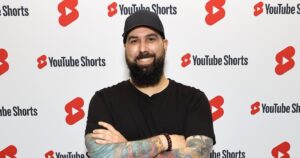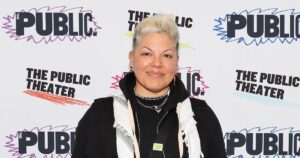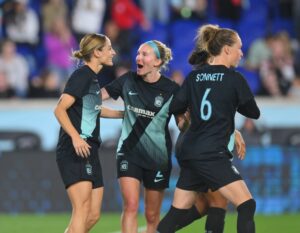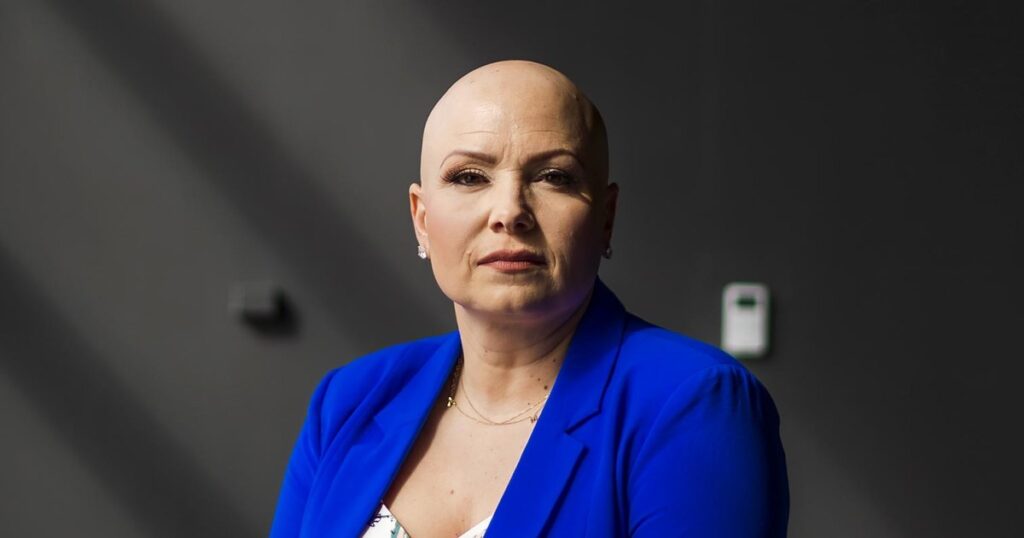
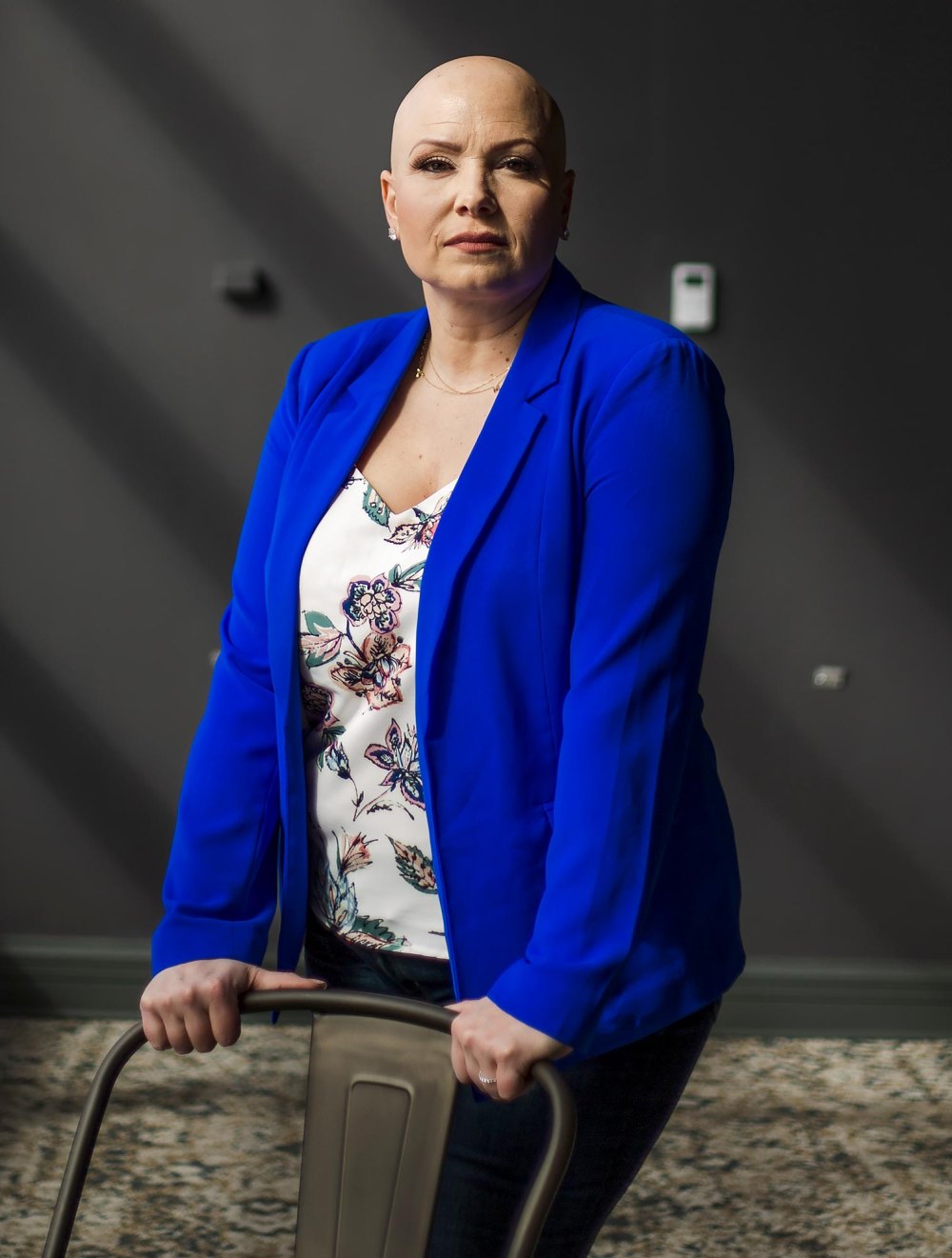
McKenna Reitz. Julie Paszczykowski
Motivational speaker McKenna Reitz wants to empower women with her story. The former high school teacher-turned-“alopecia warrior” left her lifelong calling as an educator after being diagnosed with the autoimmune disease that causes hair loss. But her diagnosis only opened new doors to self-discovery — and a realization that her hair doesn’t define her.
In a new exclusive interview with Us Weekly, Rietz talks about being inspired by Jada Pinkett Smith’s brave revelations about her own alopecia journey and how she’s taking on teaching in a whole new way – making it her mission, especially during Women’s History Month in March, to help those voices that are often unheard.
Us: Tell Us about your mission as an “Alopecia Warrior”?
McKenna Reitz: My goal is to empower women to be able to reframe their life’s challenges and opportunities. That’s what I’ve been able to do and still continue to do with other challenges in my life, not just with alopecia. I’ve been given this incredible responsibility with my story being visible that wherever I go, someone has seen that I have gone through something. But it’s how I carry myself, it’s how I present myself that hopefully empowers them to stand a little bit taller knowing that they too can fight through anything. And so when I transitioned from and took the big leap of faith of leaving the classroom this past June after 18 years of teaching AP psychology, the fire inside of me is I have to share my story to empower many to understand that they’re not alone, that we’re all in this together, that we all have a story.
Us: You’ve been on numerous talk shows. Your ultimate goal is to get your story out there to anyone who will listen.
MR: We all have something that has changed us. And when we can reframe that life challenge and reframe our mindset about it, we start to live a clearer, more purposeful life. And so it is just getting my story out there. I’m doing a lot of speaking and then also working with groups of women on a weekly basis to work more one-on-one. As women, we go in a lot of different directions, but they all have a big purpose.
Us: There are many celebrities who’ve bravely opened up about their own journeys with alopecia and hair loss. The most famous is actress Jada Pinkett Smith. She said her diagnosis was a “great teacher” and she “learned a deeper beauty within myself, being able to let my hair go.”
MR: I am very grateful for anyone who opens up because it’s a very difficult thing to talk about, especially when you are a celebrity and you are in the limelight all the time, that you are being judged and ridiculed, but also empowering others through your actions and what you are doing. And when we as women, we identify ourselves with our physical characteristics, what society has told us, whether it’s consciously or subconsciously of how we have to look or how we have to act or how we have to be, it comes down to our physical characteristics. And as women, we do identify with our hair. And when that is taken away from us, it is very difficult thing to deal with. I felt as every strand of hair that fell out of my head, my identity was being ripped away from me. I didn’t know how I was going to be a mom, how I was going to be a teacher, having that impact on my students, was my husband was still going to love me?
And having these incredible women who have the following to be able to come out and say, ‘Hey, I’m human too. I am going through same things that you are,’ and allowing others to know that they’re not alone. And I’m very grateful for any woman who comes out, not just with hair loss, but with anything they’re going through, whether it’s mental illness or a physical stability or hair loss. It’s very empowering.
Us: When you see Jada Pinkett Smith and others who’ve battled hair loss, also including actress Viola Davis, going au natural, how does that inspire you?
MR: When women show up authentically them, that is the true beauty, and it allows me to continue being me. I’m just continuing to be inspired by them that they’re still showing up and I can still show up.
I always thought that alopecia gave me my purpose, but alopecia showed me that my purpose has always been there. I just wasn’t able to see it. It almost took me 40 years of moving every hair to discover self-love.
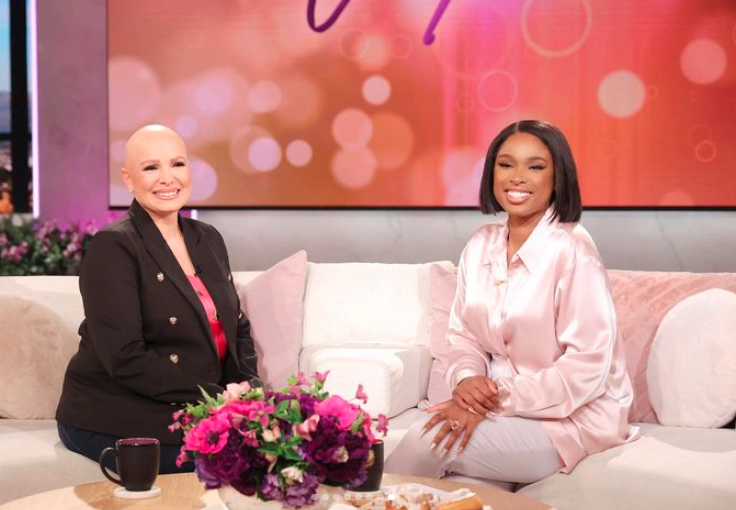
Us: March is dedicated to women as Women’s History Month. What’s your message?
MR: Our hair is not our identity. It is how we treat one another and how we show up every single day that truly identifies us. And as women, we have to celebrate each other’s wins. We have to stop comparing ourselves to each other, especially when it comes to social media. We have to be inspired that we’re still showing up. We’re still fighting every single day and be inspired by each other’s stories. And when we understand that we’re all in different parts of our journey, that everyone’s mountain is completely different at today, it’s just an easy walk for me today, but someone else is barely hanging on the ledge. When I can reach out and say, you’re strong enough that you are worth it, they will be able to climb back up on and keep climbing. But it’s when we stop comparing ourselves to one another and be inspired and continue growing. And that’s when the strength comes from within. And we understand that we are so much stronger than we ever give ourselves credit for because we’re still here, we’re still fighting. There’s no other choice.
Us: Your next passion project is writing a book. Tell about the process so far.
MR: It is! It’s my story, but it’s not going to be an autobiography. Each chapter is going to have the basis of something that happened in my life. So whether it’s losing my hair or the lessons I learned in the classroom, or being a volleyball coach or being a mom. It’s called Never Have a Bad Hair Day: Transforming Challenges Into Opportunities. And it is a way for anyone who picks up the book to understand that it’s not about hair loss, it is about understanding that every day is going to bring challenges, but it’s our attitude and how we react to them and see the silver linings that will allow us to get through that day. It’s what the day has brought for you and it’s how you’re reacting to it. And it allows us to be not only a better mom, a better wife, a better spouse, a better teacher, a better speaker, a better woman.
The goal is to have an impact on the individual reader that they feel that as though not only are they hearing my story and learning, they’re able to apply it to their own life. And then at the end of each chapter, there’s going to be reflection questions that will allow them time. I want it to be, “Let’s read a chapter, think about those reflection questions, start living our day, and then let’s go to the next chapter and then start implementing the lessons that they’re learning of how to show up and how to be a stronger woman and be a better leader.”
Us: And you just made a quick appearance at the Today Show with Hoda & Jenna.
MR: It was amazing. Hoda [Kotb] had seen me and she pulled me into it. And then I got to hang out for the rest of the time, which was incredible. And now the goal is to sit down with Hoda and talk with her about life and alopecia and reframing life challenges.
Us: You were also a guest on The Jennifer Hudson Show last year.
MR: I shared my story about being a teacher and about being a mom and a coach, transitioning the journey of alopecia and hair loss and where I was and where I am now. And then they surprised me where they had friends of mine [and] my daughters and my husband in a video talking about the impact I’ve had on them. And of course, I start crying on national TV, but it was life-changing.
Us: You talk about where you were then and where you are now. How has your life changed today?
MR: I am exactly where I need to be. I am doing things that not only challenge me, but empower me from not just sharing my story and getting on stages, but being able to have time to be a mom, to be able to take my daughters to school, to be able to go to school functions, but also do philanthropic events. I am on the board of directors at Ronald McDonald House. I still do a lot for alopecia awareness. Being able to live life.

